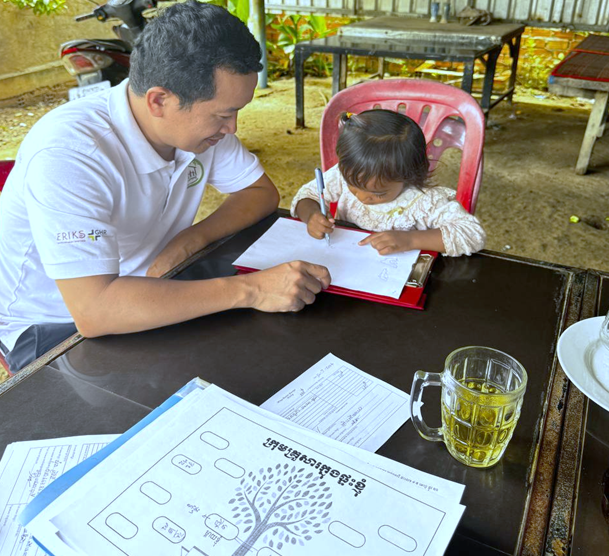
In advance of his visit to Ireland at the end of March, I caught up with Im Chetra, director of Tearfund Ireland partner M’Lup Russey in Cambodia.
 Stephen Jenkinson was the Country Director for three years for the Umbrella Foundation, an Irish organisation who support the closure of corrupt children’s homes, with the help of local authorities.. He has been on the Irish Board since 2012, with his main role being the support of the team in Nepal. After completing his Masters in Development Studies from Kimmage DSC, with a thesis exploring life skills education in institutional care in Nepal. He worked with GOAL in its post-earthquake response in Nepal and later its Syrian response. He currently lives with his family in Melbourne where he is working with young people living in out-of-home care.
Stephen Jenkinson was the Country Director for three years for the Umbrella Foundation, an Irish organisation who support the closure of corrupt children’s homes, with the help of local authorities.. He has been on the Irish Board since 2012, with his main role being the support of the team in Nepal. After completing his Masters in Development Studies from Kimmage DSC, with a thesis exploring life skills education in institutional care in Nepal. He worked with GOAL in its post-earthquake response in Nepal and later its Syrian response. He currently lives with his family in Melbourne where he is working with young people living in out-of-home care.
On 14th of May, we are hosting the conference Beyond Institutional Care: Rethinking How We Care for Vulnerable Children exploring the topic of Care Reform and why volunteering in orphanages is changing. The Umbrella Foundation, an organisation that moved away from orphanage care and now focuses on the reintegration of children back to their families, shares with us a case study that is just one part of their transitional journey. To hear more about their experience, tune into our upcoming conference!
The Umbrella Foundation’s story in Nepal is an unlikely one. This month, we are in the fortunate position of winding up our organisation in a responsible way--closing bank accounts in Ireland and Nepal, sorting final evaluations with government bodies, and figuring out how to best support a few ‘special cases’ in the years ahead. We even have surplus funds to direct to our local Nepali partner to support more care-leavers in the coming years.
But for the majority of our 17 years, as with many grassroots organisations, we struggled financially and had no real strategy that we could talk to. At our height, we had 325 children living in eight homes, with 70 staff and an average of 15 volunteers – so over 400 mouths to feed twice a day every day, and it was not uncommon to push our creditors (food suppliers, landlords, school principals, etc.) for months before payment, because we simply didn’t have it. Similarly, in terms of what was best for the children, we probably didn’t look at the big picture enough. To us, giving those in our care the best education we could afford equated to what was in their best interest. The organisation was built with big hearts but lacked proper planning.
Despite all of this, somewhere along the way we inadvertently became a leader in deinstitutionalisation – a term we would learn of years after we had begun our journey. Three things happened around 2009/10 that would lead us to shift our focus away from prioritising education, and instead focusing on getting every child that we could back with their family.
The first was a chat with our eldest youth Pasang*, then 19 or 20 and doing a bachelor’s degree, and him telling us he felt alone, that he felt like an outsider when he visited family in far west Nepal, but also didn’t feel at home in Kathmandu without family. Despite giving him the best opportunity we could afford, as an adult he felt lost.
The second came about when we realised that the expectations of those graduating from (private) school were not realistic. They wanted to follow their wealthier classmates in becoming doctors and lawyers, whereas we needed them to be self-sufficient and employable soon after leaving our care.
And finally, when the annual Dashain festival came around (the Christmas equivalent), we couldn’t help but notice the number of our children that had some sort of family in the villages. Our research found that the main reasons these family members wanted the children to remain in Umbrella’s care boiled down to private education, the cost saving, and the perceived quality of care from all the white ‘foreigners’ at Umbrella…the volunteers.
Equipped with the knowledge from these experiences, the only logical next step for us was to place all in our care into government-run Nepali-medium schools (same as in villages), build our reintegration team and processes, develop support packages for families, and begin an awareness campaign for the children, families, staff, government officials and other key stakeholders in the rural communities.
Umbrella has had over 200 successful family reintegrations and found the families of all but one of the 411 children in our care.
To hear the more in-depth experience of The Umbrella Foundation and other experienced speakers in the field of care reform, join us at the "Beyond Institutional Care: Rethinking How We Care for Vulnerable Children" conference on 14th May. Book your spot below!
*Name changed for privacy
Photo cover: Robert Collins

In advance of his visit to Ireland at the end of March, I caught up with Im Chetra, director of Tearfund Ireland partner M’Lup Russey in Cambodia.

A story of twin brothers in Cambodia